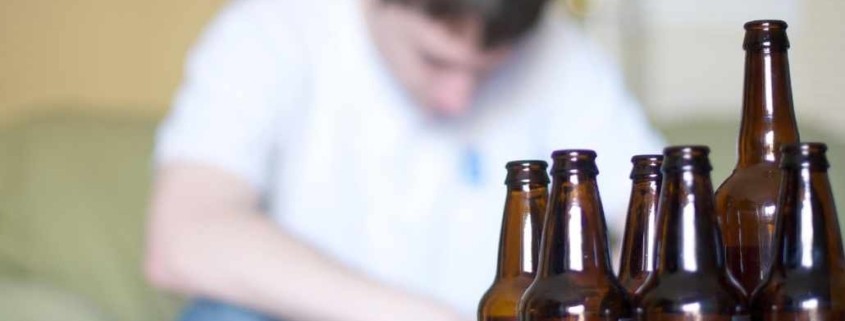Why Do People Binge Drink Alone?
Table of Contents
Binge drinking is often linked with college parties and socializing in general. So, what does it mean when someone engages in binge drinking alone?
Most of us have either participated or witnessed binge drinking in real time. Drinking games or heavy partying can cause someone to consume dangerous amounts of alcohol in a short time. This increases the risk of alcohol poisoning, which can even be fatal.
But what about the people who binge drink in the privacy of their homes? It is hard to understand why anyone would drink alone. Even more so, why would they drink large amounts while alone by themselves? Let’s explore this practice, and discuss the risks.
What Is Binge Drinking?
Binge drinking refers to the practice of consuming large quantities of alcohol in a short time span. For women, this means consuming four or more alcoholic beverages within two hours, and for men, it entails consuming five or more alcoholic beverages. The National Institute on Alcohol Abuse and Alcoholism defines an alcoholic beverage as:
- One 1.5-ounce shot of 40% alcohol spirits
- One 5-ounce glass of wine
- One 12-ounce bottle of beer
Someone who consumes more alcohol in a two-hour period than his or her body can safely metabolize is at a greater risk of experiencing alcohol poisoning. In addition, habitual binge drinking can result in an alcohol use disorder with serious long-term consequences.
CDC statistics about binge drinking include:
- One in six U.S. adults binge drinks about four times a month and consumes about eight drinks per binge session.
- Binge drinking is more common among those with household incomes of $75,000 or more, versus those with lower incomes.
- It is assumed that binge drinking is more common among young adults aged 18–34 years. However, binge drinkers over age 65 report binge drinking more often, about five to six times a month on average.
- About 92% of U.S. adults who drink excessively report binge drinking in the past thirty days.
- Although college students commonly binge drink, most binge drinking episodes involve adults older than age twenty-six.
- The prevalence of binge drinking among men is twice the prevalence of women.
Why is Binge Drinking Harmful?
Binge drinking can result in alcohol poisoning, which is a health emergency that can lead to coma or death. Also, those who binge drink may be at a higher risk of developing alcohol dependence later.
The human body can only process a certain amount of alcohol per hour. The liver metabolizes about one ounce of liquor per hour. When an excess amount of alcohol is consumed, it results in the non-metabolized alcohol accumulating in the blood.
When the system becomes overwhelmed by too much alcohol, it causes poisoning in the body. The signs of a person having alcohol poisoning include:
- Has a low body temperature.
- Fades in and out of consciousness.
- Becomes unresponsive.
- Skin becomes cold, clammy, and blue-tinged.
- Mental confusion or stupor.
- Breathing slows.
- Vomits while passed out.
- Has seizures, spasms, or convulsions.
- Falls into a coma.

Why Would Someone Binge Drink Alone?
Drinking alone has always had a negative stigma attached. After all, alcohol is considered a social tool that helps people relax and enjoy each other. With this in mind, why would someone binge drink alone? Some of the reasons include:
- They can hide their drinking problem from others. Someone struggling with alcohol use disorder (AUD) may prefer to remain discreet about the problem. By drinking alone, there are no witnesses.
- They may suffer from depression. A person battling depression may withdraw socially as they lose interest in things they once enjoyed doing. Alcohol can become a maladaptive coping tool. They drink alone in hopes of escaping the symptoms of depression.
- They use alcohol to help induce sleep. People who suffer from insomnia might binge drink alone in an attempt to get to sleep. This is not only unhealthy but only worsens the sleep problem. The high sugar content in alcohol disrupts the sleep cycle.
There is no good reason why someone should engage in binge drinking alone at home. The practice is very unsafe, as alcohol poisoning or an accident could occur. No one would be there to call for help.
The Dangers of Binge Drinking Alone
An occasional glass of wine while relaxing at home alone is not a danger. However, habitual drinking, especially when to excess, can carry many risks:
- Increased risk of alcohol poisoning. Drinking alone with no one around may not start out as binge drinking, but it could end up that way. It is not safe when no one is there to pace the drinking or be a safeguard against excessive drinking. Consuming too much alcohol in a short period can result in alcohol poisoning, which can be fatal.
- Increased risk of blackouts. Binge drinking, whether alone or with others, can result in a memory blackout. This is when you wake up the next day and have no memory of what you did the night before.
- Increased risk of accidental injury. Being all alone while drinking a large amount of alcohol can be dangerous. You can fall, start a fire, or injure yourself while intoxicated, and would not have anyone present to help you.
- Increased risk of suicide. For someone who is battling depression, drinking alone can increase the risk of suicide. As a depressant, alcohol can make depression symptoms feel more pronounced, including thoughts of suicide.
Getting Help for Alcohol Use Disorder
Habitual binge drinking is considered an AUD because the drinking behavior may result in adverse consequences. To overcome AUD, you can enroll in a comprehensive treatment program that is based on an evidence-based approach. Treatment will provide the help needed to make the changes needed to sustain sobriety.
Bodhi Addiction Treatment and Wellness offers hope for those struggling with AUD. If you find yourself binge drinking alone, you will need support to overcome the AUD. Our program uses the perfect blend of evidence-based therapies and holistic methods to achieve successful results. Call our team today at (877) 328-1968.



